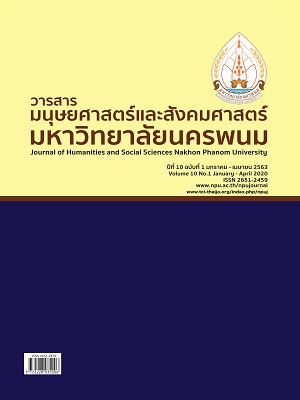จริยธรรมในการดำเนินธุรกิจชุมชนที่ได้รับการรับรองคุณภาพผลิตภัณฑ์ชุมชนในจังหวัดขอนแก่น
Main Article Content
Abstract
The objectives of this study were 1) to investigate community business ethics, 2) to analyze factors related to community business ethics, and 3) to determine at least one factor affecting related to community business ethics. The sample of this study was 140 members in community business with product quality certification within Khon Kaen Province. The five-rating scale questionnaire was used as the research instrument to collect data. The research instrument was validated to determine the reliability using Index of Item – Objective Congruence (IOC). The results showed that the Index of Item – Objective Congruence (IOC) of the questionnaire was 0.7-1.0. The reliability was determined using Cronbach’ coefficient alpha. The results showed that Cronbach’ coefficient alpha of community business management items was 0.88; Cronbach’ coefficient alpha of organizational commitment items was 0.76; Cronbach’ coefficient alpha of sufficiency economy philosophy items was 0.91 and Cronbach’ coefficient alpha of community business ethics was 0.79. Data were analyzed through statistics including mean, standard deviation, Pearson product-moment correlation coefficient, and Multiple Regression Analysis.
The results of this study indicated that 1) Overall community business ethics was at a high level. When individual aspects were considered, an aspect with the highest mean score of ethics was reliability, followed by integrity. Environmental maintenance was an aspect with the lowest mean score of ethics. 2) Factors positively related to community business ethics were community business management factor in terms of human resource management, production management, finance and accounting management, as well as organizational commitment factor in terms of commitment to organizational goal and value, organizational reputation and image protection, dedication to organizational benefits, needs for retaining organizational citizenship, and sufficiency economy philosophy factor in terms of modesty, rationality , good immunity, and moral conditions. 3) There were three factors predicting community business ethics (y) including sufficiency economy philosophy factors (x1), followed by organizational commitment (x2), and community business management (x3). These variables could predict 67% of the variations in community business ethics (y) and with an error of ±0.21. The regression equation could be developed as follows:
y = 0.07 + 0.42 x1 + 0.32 x2 + 0.20 x3


